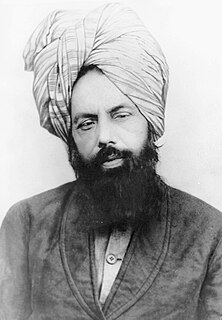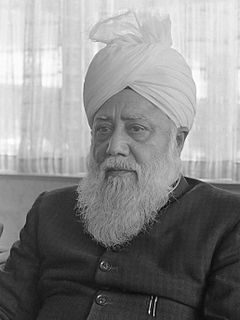
Clinton Richard Dawkins, is an English ethologist, evolutionary biologist, and author. He is an emeritus fellow of New College, Oxford, and was the University of Oxford's Professor for Public Understanding of Science from 1995 until 2008.
The teleological or physico-theological argument, also known as the argument from design, or intelligent design argument is an argument for the existence of God or, more generally, for an intelligent creator based on perceived evidence of deliberate design in the natural world.

Mirzā Ghulām Ahmad was an Indian religious leader and the founder of the Ahmadiyya Movement in Islam. He claimed to have been divinely appointed as the promised Messiah and Mahdi—which is the metaphorical second-coming of Jesus (mathīl-iʿIsā), in fulfillment of Islam's latter day prophecies, as well as the Mujaddid of the 14th Islamic century.
The existence of God is a subject of debate in the philosophy of religion and popular culture.

al-Barāhīn al-Ahmadīyyah 'alā Haqīqatu KitābAllāh al-Qur'ān wa'n-Nabūwwatu al-Muhammadīyyah is a five-part book written by Mirza Ghulam Ahmad, the founder of the Ahmadiyya Movement. The first two parts were published in 1880 CE, the third volume was published in 1882, the fourth volume in 1884 and the fifth volume in 1905. In writing the book, Ghulam Ahmad sought to rejuvenate Islam by arguing for the validity of its principles and vindicating its teachings in response to Christian and Hindu polemics against Islam as well as atheistic philosophies. In this context, a significant portion of the subject matter of the book is dedicated to the defence of Islam as a whole against the criticism of Muhammad, the Qur'an and Islam that was raised in the 18th and 19th centuries predominantly by Christian missionaries and Hindu revivalists.

The watchmaker analogy or watchmaker argument is a teleological argument which states, by way of an analogy, that a design implies a designer. The analogy has played a prominent role in natural theology and the "argument from design," where it was used to support arguments for the existence of God and for the intelligent design of the universe, in both Christianity and Deism.

The quinque viae are five logical arguments regarding the existence of God summarized by the 13th-century Catholic philosopher and theologian St. Thomas Aquinas in his book Summa Theologica. They are:
- the argument from metaphysical motion;
- the argument from efficient causation;
- the argument from contingency;
- the argument from degrees of being;
- the argument from final causality.

The God Delusion is a 2006 best-selling book by English biologist Richard Dawkins, a professorial fellow at New College, Oxford and former holder of the Charles Simonyi Chair for the Public Understanding of Science at the University of Oxford.

Dawkins' God: Genes, Memes, and the Meaning of Life is a book by Alister McGrath, a theologian who is currently Professor of Historical Theology at Oxford University. The book, published in 2004, with a 2nd ed. in 2015, aims to refute claims about religion made by another well-known professor at Oxford, Richard Dawkins. McGrath's book does not seek to demonstrate how Dawkins’ claims differ from Christianity, rather, it argues that Dawkins' arguments fall far short of the logical and evidence-based reasoning that Dawkins himself espouses.
The Ultimate Boeing 747 gambit is a counter-argument to modern versions of the argument from design for the existence of God. It was introduced by Richard Dawkins in chapter 4 of his 2006 book The God Delusion, "Why there almost certainly is no God".

Hāfiz Mirza Nasir Ahmad was the third caliph, head of the Ahmadiyya Muslim Community. He was elected as the third successor of Mirza Ghulam Ahmad on 8 November 1965, the day after the death of his predecessor and father, Mirza Basheer-ud-Din Mahmood Ahmad.

Since the emergence of the Big Bang theory as the dominant physical cosmological paradigm, there have been a variety of reactions by religious groups regarding its implications for religious cosmologies. Some accept the scientific evidence at face value, some seek to harmonize the Big Bang with their religious tenets, and some reject or ignore the evidence for the Big Bang theory.

The view on the Prophets of God in Ahmadiyya theology differs significantly from Orthodox Islam. The main difference centres on the Quranic term Khatam an-Nabiyyin with reference to Muhammad which is understood by Ahmadis in terms of perfection and testification of prophethood instead of chronological finality. Accordingly, Muhammad is held to be the last prophet to deliver a religious law to humanity in the form of the Quran whose teachings embody a perfected and universal message. Although, in principle, prophets can appear within Islam, their prophethood is dependent upon and reflective of that of Muhammad, that is, within his Seal; and their role is merely that of reviving and purifying the faith. They cannot be prophets in their own right and cannot change, add to or subtract from the religious law of Islam. As such, Ahmadis, regard their founder Mirza Ghulam Ahmad as a prophet who appeared as the promised Messiah and Mahdi in accordance with Islam's eschatological prophecies. In contrast to mainstream Muslims who believe Jesus to be still alive and one who would return himself towards the end of time, Ahmadis believe Jesus to have died a natural death and view the coming of such an independent, Israelite prophet to amount to breaking the Seal of Prophethood.
Gautama Buddha, the founder of Buddhism, is also venerated as a manifestation of God in Hinduism and the Bahá'í faith. Some Hindu texts regard Buddha as an avatar of the god Vishnu, who came to Earth to delude beings away from the Vedic religion. He is also regarded as a prophet by the Ahmadiyya Muslim Community.

The Ahmadiyya Movement in Islam universally accepts the process of evolution, albeit divinely guided, and actively promotes it. Over the course of several decades, the movement has issued various publications in support of the scientific concepts behind the process of evolution and frequently engages in promoting how religious scripture supports the concept.

The Ahmadiyya Muslim Community is an Islamic movement that was founded by Mirza Ghulam Ahmad in the late 19th century. Judaism is another Abrahamic religious group. Ahmadis and Jews have not interacted much in the history.

Tadhkira (تذکرة) is a collection of the revelations, dreams and visions of Mirza Ghulam Ahmad, founder of the Ahmadiyya Muslim Community. The English rendering of the Urdu, Arabic and Persian text was initially done by Sir Chaudry Muhammad Zafarullah Khan in 1976. The present revised edition has been published in 2009 under the auspices of Mirza Masroor Ahmad, Imam and Head of the Worldwide Ahmadiyya Muslim Jama'at, fifth successor to the Promised Messiah, by Islam International Publications Ltd.























